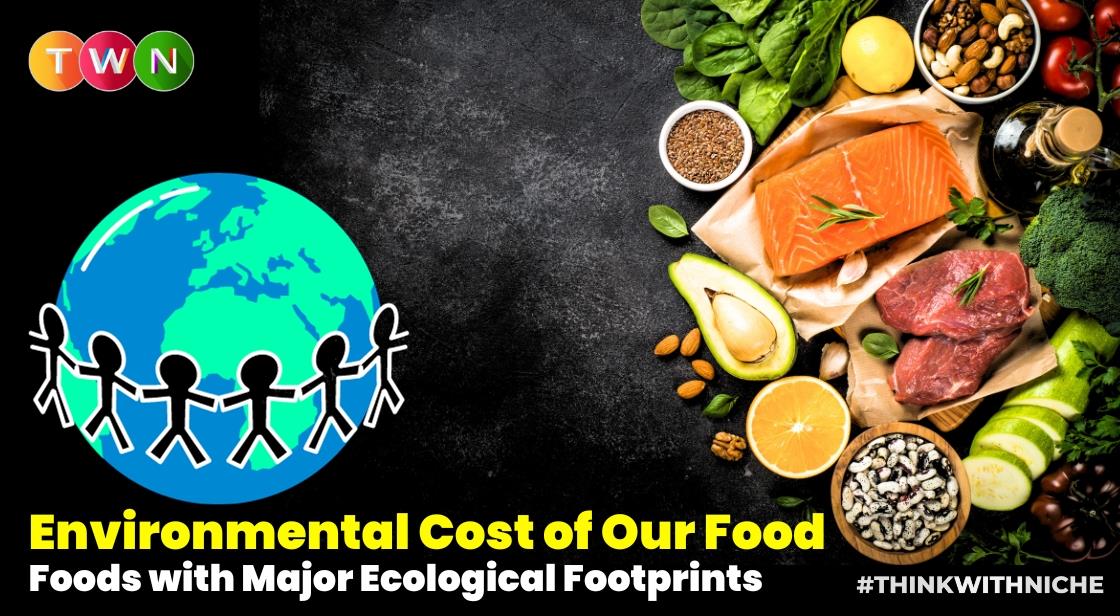Understanding the Environmental Cost of Our Diet: Foods with Major Ecological Footprints

Blog Post
In an era where climate change and environmental sustainability are at the forefront of global discussions, understanding the impact of our dietary choices on the planet has never been more crucial.
The food we consume daily, often without a second thought about its origins or production methods, significantly contributes to environmental issues like greenhouse gas emissions, deforestation, and water scarcity.
This blog post delves into the intricate relationship between food production and environmental health, providing an eye-opening perspective on how our meals, from farm to table, affect the planet's well-being.
Eating Green: How Our Diet Choices Impact the Planet
The connection between what's on our plates and the health of our environment is complex and multifaceted. Certain foods, particularly those of animal origin, have a disproportionately large ecological footprint, contributing to high levels of greenhouse gases, excessive water usage, and habitat destruction.
This blog will unravel the details behind these impacts, ranking various food items based on their greenhouse gas (GHG) emissions and water withdrawals. The startling revelation that some of our favourite foods, like beef and dark chocolate, are among the biggest environmental culprits, is a call to action for more conscious eating habits.
We'll explore the metrics used to measure these impacts, such as Carbon Dioxide Equivalent (CO2e) emissions, and discuss why animal products generally have a higher environmental toll compared to plant-based foods.
This narrative will also shed light on the global perspective of food emissions, breaking down the misconception that local sourcing is the ultimate solution to reducing our food's environmental impact.
The blog aims to equip readers with the knowledge to make more sustainable food choices, emphasizing that our individual decisions can collectively make a significant difference.
Through this exploration, we aim to foster a deeper understanding of sustainable consumption and its crucial role in mitigating climate change. By the end of this post, readers will have a comprehensive view of how simple changes in diet can contribute to a healthier planet.
From Farm to Fork: The Environmental Cost of Food
Explore the environmental impact of various foods, from beef's high carbon footprint to the water-intensive nature of agriculture. This blog delves into how making sustainable food choices, focusing on plant-based options, can significantly reduce our ecological footprints, leading to a healthier planet.
The Environmental Toll of Our Food Choices
Important Tags: Environmental-Impact Of Food, Greenhouse Gas Emissions, Carbon Footprint Of Beef
The foods we consume daily play a substantial role in environmental degradation. Among various food items, beef stands out as the most significant contributor to greenhouse gas emissions. They are producing a single kilogram of beef results in an astounding 99 kilograms of CO2e emissions.
This high carbon footprint is primarily due to the resource-intensive nature of beef production, which demands large tracts of land, significant water resources, and extensive energy. Additionally, cows produce methane during digestion, a potent greenhouse gas. Understanding these impacts is crucial for making informed dietary choices that are less harmful to the planet.
Dark Chocolate and Deforestation: A Surprising Contributor
Important Tags: Dark-Chocolate Emissions, Deforestation Impact, Global Chocolate Production
Dark chocolate, often considered a benign luxury, has a surprisingly significant environmental impact. The majority of its emissions are attributed to land use changes, such as deforestation, which disrupts the balance of greenhouse gases and diminishes the Earth's capacity to absorb CO2.
The production of dark chocolate involves clearing large areas of forest, which not only releases stored carbon but also reduces biodiversity. This revelation about a beloved treat underscores the importance of considering the broader ecological implications of our food choices.
The Real Cost of Animal Products
Important Tags: Methane-Emissions From Livestock, Animal and Plant-based Products, Farming Emissions
Animal products, in general, are more emission-intensive compared to plant-based foods. Livestock farming contributes significantly to methane emissions, a gas with a warming potential far greater than CO2. The production of animal-based foods requires more resources in terms of land, water, and energy, leading to higher greenhouse gas emissions.
By contrast, plant-based foods typically have a smaller environmental footprint, making them a more sustainable choice for those looking to reduce their ecological impact.
The Burden of Water Use in Food Production
Important Tags: Water use in Agriculture, Freshwater Withdrawal, Sustainable Water Use
Water usage is another critical environmental aspect of food production. Foods of animal origin, such as cheese, beef, and lamb, are among the most water-intensive. For instance, producing one kilogram of cheese requires over 5,000 litres of water.
The high water demand for these products is due to the water-intensive nature of feed crops and the direct water needs of livestock. This highlights the need to consider water resources when making dietary choices.
Local Vs. Global: Rethinking Food Sourcing
Important Tags: Local Food Sourcing, Global Food Emissions, Transportation Emissions
The debate between local and global sourcing of food is complex. While locally sourced foods are often advocated as more sustainable, the production process itself has a more significant environmental impact than transportation.
For instance, transporting food accounts for only a small fraction of its overall emissions. Hence, focusing on the production methods and choosing foods with lower environmental impacts can be more effective in reducing our ecological footprint.
Making Sustainable Food Choices: A Path Forward
Important Tags: Sustainable Food Choices, Eco-friendly Diet, Plant-based Diet Benefits
Making sustainable food choices involves a shift towards more eco-friendly diets. Plant-based foods generally have a lower environmental impact compared to animal-based products.
By opting for a diet rich in plant-based foods, consumers can significantly reduce their carbon and water footprints. This shift not only benefits the environment but can also lead to healthier eating habits.
The Global Picture: Food Emissions Beyond Borders
Important Tags: Global food production impact, Sustainable Agriculture, Dietary Choices for Planet Health
Our dietary choices have a global impact on food emissions. Sustainable agriculture plays a crucial role in reducing the environmental impact of food production. Globally, shifting towards more sustainable farming practices and reducing the consumption of high-impact foods can significantly lower greenhouse gas emissions and promote a healthier planet.
Unpacking the CO2e Metric in Food Production
Important Tags: Carbon dioxide Equivalent (CO2e), Standardizing Greenhouse Gas Measurement
The Carbon Dioxide Equivalent (CO2e) metric is essential in understanding the environmental impact of different foods. It provides a standardized way to measure and compare the warming effects of various greenhouse gases.
This metric is crucial for assessing the overall environmental impact of our dietary choices and guiding us towards more sustainable eating habits.
Also Read : The Role of FinTech in Promoting Biodiversity Conservation
Addressing the Challenge of Sustainable Eating
Important Tags: Eco-conscious Consumerism, Sustainable-diet Challenges, Environmental Awareness
Embracing sustainable eating can be challenging, as it often involves changing long-established dietary habits. However, increased environmental awareness and understanding can empower consumers to make more informed and sustainable food choices. Overcoming these challenges requires a concerted effort to educate and encourage eco-conscious consumerism.
The Role of Agriculture in Climate Change
Important Tags: Agriculture and Climate Change, Farming Practices, Sustainable Farming Methods
Agriculture significantly contributes to climate change, but it also holds the potential for mitigation. Sustainable farming methods, such as organic farming and regenerative agriculture, can reduce agriculture's environmental impact.
These practices focus on soil health, and biodiversity, and reduce reliance on synthetic inputs, offering a more sustainable way to produce food.
The Consumer's Dilemma: Balancing Nutrition and Sustainability
Important Tags: Nutritional Needs, Sustainable Diets, Consumer Choices
Balancing nutrition and environmental sustainability can be a dilemma for many consumers. A diet that is both nutritious and eco-friendly is achievable, but it requires careful consideration of food choices. By opting for foods with lower environmental impacts and high nutritional value, consumers can support their health and the health of the planet.
The Future of Food: Innovations and Alternatives
Important Tags: Food Technology Innovations, Alternative Proteins, Future of Food Production
The future of food production is being shaped by innovations and alternatives aimed at reducing environmental impact. Developments in food technology, such as lab-grown meat and plant-based alternatives, offer promising solutions for sustainable food systems.
These innovations have the potential to meet our dietary needs while minimizing ecological footprints.
In conclusion, our dietary choices have profound implications for the environment. Understanding the environmental impact of different foods, particularly the high emissions from animal products and the water-intensive nature of agriculture, is essential for making eco-conscious decisions.
By opting for more plant-based foods and supporting sustainable agriculture, we can significantly reduce our ecological footprint and contribute to a healthier planet. The future of food lies in embracing these sustainable choices and innovations, paving the way for an eco-friendly and nutritious diet.
You May Like
EDITOR’S CHOICE












